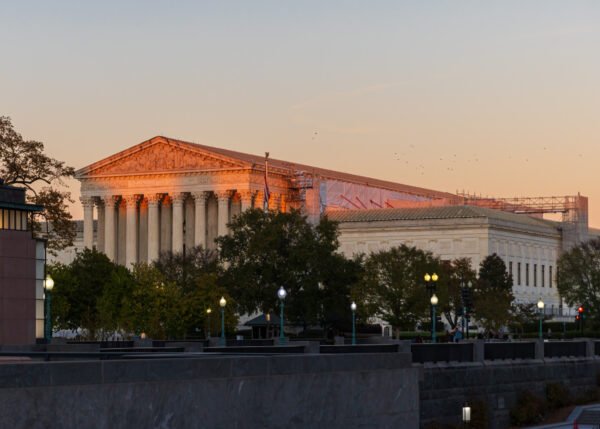The Many Limitations of the Respect for Marriage Act

Ray has with OUT FRONT Magazine since February of 2020.…
On December 13, 2022, President Joe Biden signed the Respect for Marriage Act into law, granting federal protections for both same-gender and interracial marriages. However, the bill does have some key limitations, leaving the future of marriage equality hanging in the balance of the Supreme Court.
Anti-LGBTQ state laws could undercut the Respect for Marriage act, should the Supreme Court choose to overturn same-gender marriage protections. The act also leaves an exemption for religious nonprofits to not recognize same-gender marriages, which could affect adoption opportunities for queer couples. In addition, the act fails to address a long-lasting problem that penalizes the marriages of people with disabilities—regardless of their sexuality.
But the most glaring limitation of all is that the legality of same-gender marriage still rests on the 2015 Supreme Court case Obergefell v Hodges. Should the Supreme Court overturn Obergefell, same-gender marriage laws would return to the states.
Startlingly, a majority of states, both conservative and liberal, have pre-existing laws that ban same-gender marriages. Thirty-two states, including Colorado, have either constitutional or statutory bans on same-gender marriage, which would go back into effect should Obergefell be overturned. The Respect for Marriage Act wouldn’t change that, but it requires all states to recognize same-gender marriages performed in other states and federally recognizes these marriages.
The Respect for Marriage act repealed the 1996 Defense of Marriage act, which was signed by President Bill Clinton and defined marriage as “one man, one woman.” In 2013, the Supreme Court ruled that part of this law was unconstitutional in the case U.S. v Windsor. In 2015, the court issued another ruling, Obergefell v Hodges, which required all states to li- cense and recognize same-gender marriages.
Concern for the future of marriage equality ramped up last year when the Supreme Court ruled to overturn federal protections for the right to abortions in Dobbs v. Jackson. Supreme Court Justice Clarence Thomas released an opinion concurrent with the ruling which suggested the court should review other cases under the 14th amendment right to “equal protection under laws” such as the right to contraception and same-gender marriages.
When the Respect for Marriage act passed through the Senate, it had a religious liberty amendment attached to it. This language codifies the rights of religious non-profits—including faith-based institutions, mission organizations, religious educational institutions, and others—to not celebrate or, in some instances, recognize a marriage that conflicts with their faith.
In doing so, such organizations are allowed to deny “services, accommodations, advantages, facilities, goods, or privileges for the solemnization or celebration of a marriage.” In short, religious institutions could still refuse to host or officiate wedding ceremonies, or to provide services, on the basis of religious liberty.
The amendment follows the precedent set by the 2021 Supreme Court ruling of Fulton v. Philadelphia, which declared that a Christian adoption agency could refuse to work with same-gender couples. The argument of religious liberty has long since been used as a proponent of discrimination against same-gender couples, transgender people, women, and others.
Finally, the Respect for Marriage act does not grant protection for people with disabilities, and those individuals still do not have marriage equality. The Disabled Adult Child (DAC) marriage penalty affects any disabled person who receives disability stipends and Medicaid. Should someone who receives a monthly DAC benefit marry, they lose access not only to their stipend but their insurance as well. For many disabled Americans, this means marriage is not a viable option for them.
While the Americans with Disabilities act provides equal access to public accommodations and employment, it does not protect against the DAC marriage penalty. The Respect for Marriage act does not address these issues at all. Advocates have pushed for the passage of the Marriage Equality for Disabled Adults Act, which would remove the penalty from federal law; however, the bill has stalled in the House of Representatives since January 2022.
While the Respect for Marriage act is an important win for same-gender and interracial couples, its many limitations including; states rights should Obergefell be over turned, religious exemptions, and the unacknowledged needs of people with disabilities.
What's Your Reaction?
Ray has with OUT FRONT Magazine since February of 2020. He has written over 300 articles as OFM's Breaking News Reporter, and also serves as our Associate Editor. He is a recent graduate from MSU Denver and identifies as a trans man.










